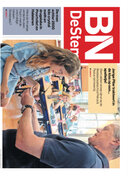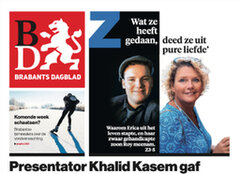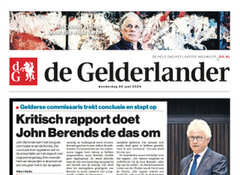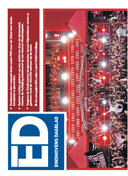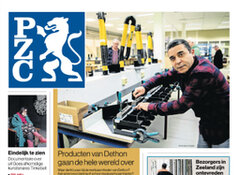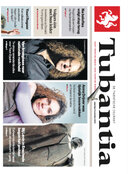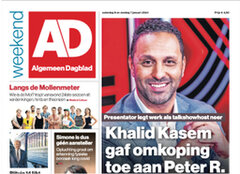King’s commissioner stepped down after allegations of misconduct
Did we treat John Berends correctly?
John Berends lost his job as King’s Commissioner after anonymous sources contacted De Gelderlander. How does a medium deal with this?
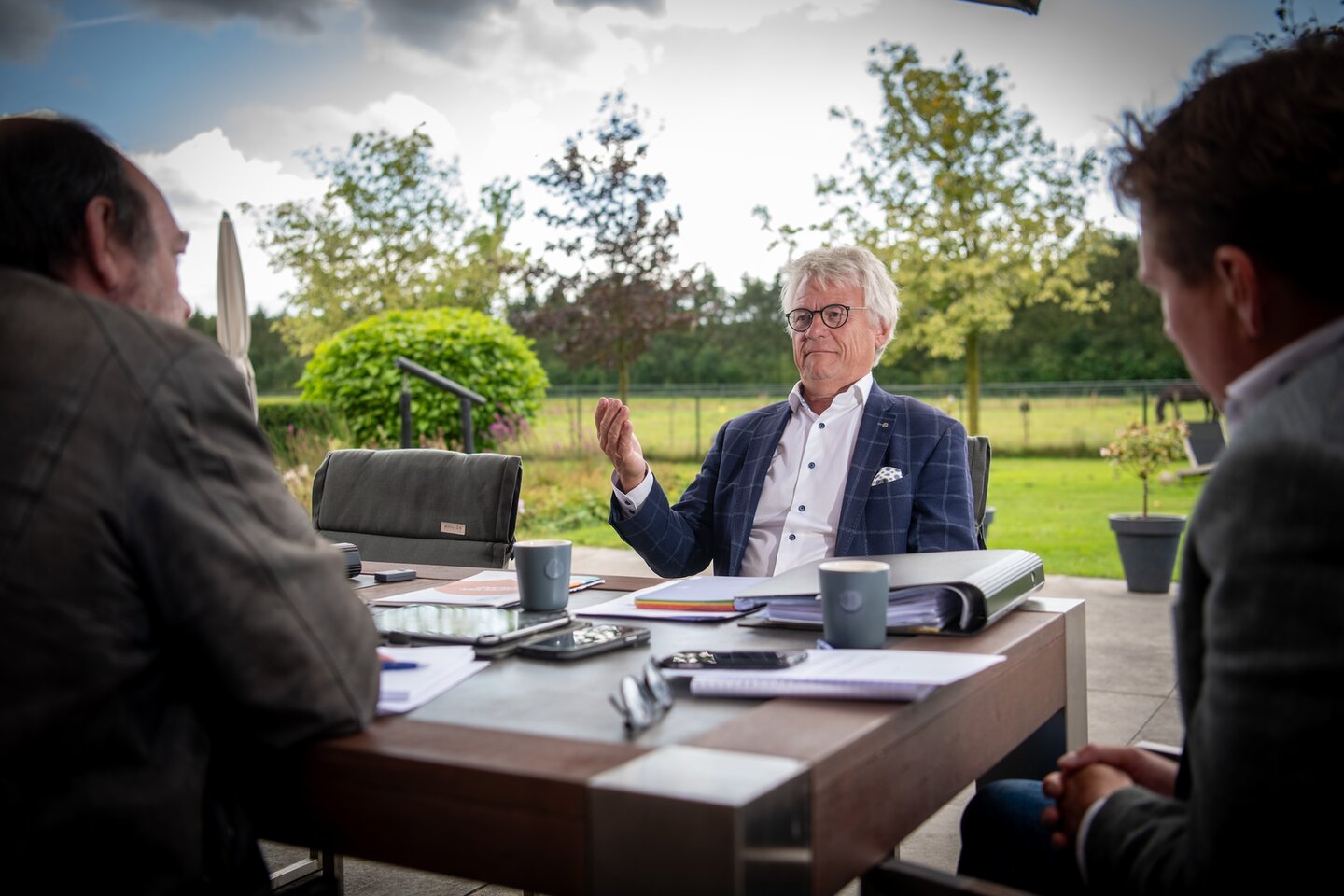
John Berends (right) with reporter Gep Leeflang (left)
H
e felt that he had been “been hung out to dry upside down”, in which case “something will always fall out of the pocket”. This is what John Berends, the King’s Commissioner, mentioned in a major interview with De Gelderlander earlier this year.
In 2023, the paper published two stories about transgressive behaviour. One was about John Berends, the King’s Commissioner, and the other was about Rector Magnificus Han van Krieken of Radboud University (see the text box). Both articles caused a stir and both Berends and Van Krieken resigned.
Berends resigned after officials had contacted the newspaper to complain about transgressive behaviour. Although an investigative committee concluded months later that there was no evidence for transgressive behaviour, just for inappropriate behaviour, Berends had to step down.
An executive confronting a public employee with their poor performance? Is this no longer allowed?
The executive considers this, to this day, to be unjust. The investigative committee found no evidence for the strongest accusations and what exactly is inappropriate behaviour? An executive confronting a public employee with their poor performance? Is this no longer allowed?
What also really bothers Berends is that the officials reported their story anonymously in the media. In his eyes, this makes executives sitting targets. Of course we also discussed internally whether we did the right thing in this case. Was it fair to write an article based on anonymous sources? Was this the right way to do it?
Anonymous sources
We will start with the question: why do we use anonymous sources? We obviously prefer to speak to people on the record. It is important for the public to know the sources of information. But in this case, people talking to the media are also at risk. The executive they are talking about is, after all, their boss.
These people’s careers often depend on that same person. In addition, people don’t want to be known as being a snitch. As a whistleblower. As a news outlet, it is therefore unavoidable for us to work with anonymous sources in some cases. But this means that we have to work very meticulously. We also wanted to be really sure of our facts in this case. Because we had many sources with the same story, we feel that our reporting was accurate.
Because we had many sources with the same story, we feel that our reporting was accurate
A second point is whether we provided enough opportunity for the right to reply. You have to be generous in providing this in such cases. There again, we feel that we provided enough opportunity and time, although we were also pleased and grateful that Berends eventually agreed to an interview to give his side of the story.
There are also factors that we should possibly have looked at more closely beforehand. For example, why was it relevant for the people to report their story? What was their motivation to come forward at this particular point in time? We did not look into this question in great depth. It is possible that an answer to this question may have resulted in an even more balanced picture.
All things considered, we still stand by the 2023 publication. However, we do feel that we can learn from how we dealt with this matter. We are currently working on an internal protocol on how to deal with these kinds of stories. It is crucial that we take a very critical look with one another at the entire process before publication.
Joris Gerritsen
Editor-in-chief of De Gelderlander

Decision of the Netherlands Press Council on report on Hans van Krieken
In December, the Netherlands Press Council ruled on two reports by De Gelderlander on Hans van Krieken. In September 2023, the newspaper revealed that Van Krieken’s knuckles had been rapped internally five years earlier. At the time, he had made two remarks to a university employee that she felt were sexually transgressive. She subsequently filed a complaint with the university. An independent committee concluded that the remarks could have been perceived as potentially transgressive and therefore ruled in favour of the woman. Van Krieken apologised and received a non-public warning.
In the months following the first publication in De Gelderlander, this case reappeared several times in the newspaper’s coverage. Van Krieken filed a complaint this year on two articles written in the first months of 2024. He felt that the references in the two publications were incorrect and therefore biased.
The Netherlands Press Council agreed with Van Krieken and concluded that the way in which the newspaper reported on the matter in both publications, which led to Van Krieken’s resignation, gave such a distorted picture that incorrect and biased reporting was evident.
The Netherlands Press Council’s ruling led to dissatisfaction and incomprehension among some members of the editorial team. Van Krieken’s complaint concerned two follow-up articles, but the ruling also seems to provide scope to criticise the original article. The editorial team feels that it was unable to defend itself in this and that the article could still withstand the test of criticism. On the other hand, they are also aware of the scope of follow-up articles, in which all nuances cannot always be reported again in full, as is the case in a supporting, original article. The same applies to the sensitivity that this and other topics pose.
The 6 of
De Gelderlander
Journalism is changing rapidly. News stories used to revolve around the five Ws (who, what, where, when, why) and the h (how), but we now offer a diverse range of narrative forms. New stories constantly appear on our website and app, but readers have indicated that they would like to get a review summarising the stories.
This is why we introduced ‘The 6 of De Gelderlander’: the sixth article on our website provides a summary of the main regional, national and international news in six subject matters. Prefer to listen? There is also a podcast version.
proud
The war in my head

“Thank you! I just read my father’s story. I’m very happy that his story has been immortalised in this way.” This is what Bianca Beckers emailed to the editorial team of De Gelderlander this autumn. Her father, the 89-year-old Harrie Beckers, was on the cover of a special supplement: ‘The war in my head’. Eighty years after Operation Market Garden, De Gelderlander interviewed eighty people about the role that World War II still plays in their lives.
Well-known Gelderlanders such as Jan Terlouw, Maarten van Rossum and Hans Dorrestein were among these eighty people. However, it was the powerful, personal stories of ordinary people that were highlighted.
This resulted in wonderful stories that, together with compelling portrait photos by photographer Raphale Drent, helped create an impressive supplement. And not only that, the editorial team also compiled the stories in a marvellous book. A project to be proud of.

ADR Nieuwsmedia zit in de haarvaten van Nederland
Algemeen Dagblad en de zeven regionale titels van DPG Media vormen één groep: ADR Nieuwsmedia. Binnen deze grootste nieuwsorganisatie van Nederland wordt nauw samengewerkt. Hoe gebeurt dat?
We vragen het onze abonnees in Gelderland, Brabant, Twente of Zeeland elk jaar opnieuw, maar we kennen het antwoord: zij lezen onze sites, apps en kranten vooral vanwege het regionale nieuws. Dat geldt trouwens niet alleen voor lezers uit die genoemde streken. Ook de AD-lezers in en rond Den Haag, Utrecht of Rotterdam zetten ‘lokaal nieuws’ bovenaan hun lijstje van favoriete artikelen. Meteen daaronder staat vaak hun favoriete voetbalclub.
Het enorme belang dat abonnees stellen in nieuws uit hun eigen buurt deed kranten decennia geleden besluiten zich te concentreren op de beste regionale verslaggeving. Voor zaken als binnenlandse politiek, buitenland, economie, cultuur of topsport bundelden ze de krachten in gemeenschappelijke persdiensten. Zo ontstonden de Zuid-Oost Pers, de GPD en de Wegener Persdienst. Die laatste persdienst verdween toen DPG Media tien jaar geleden de regionale kranten van Wegener kocht. AD en de zeven regionale kranten werken sindsdien samen in ADR Nieuwsmedia.
Proud
Een centrale redactie met 200 journalisten van het AD en de samenwerkende titels in de regio, verzorgt vanuit Rotterdam het (inter)nationale nieuws. Zodat De Gelderlander zich kan richten op de eigen provincie en de PZC zich alleen bezig hoeft te houden met Zeeland.
De stroom nieuws gaat niet alleen van Rotterdam naar de regio, maar ook omgekeerd. Als er in Eindhoven of Enschede iets groots gebeurt, delen het ED en Tubantia dit nieuws onmiddellijk met het AD en de andere regionale titels. Het maakt ADR, zeker buiten de Randstad, tot een van de snelste nieuwsorganisaties en zeker de meest wijdvertakte. Want ADR beschikt over ruim 800 journalisten en een netwerk van lokale correspondenten. ADR zit in de haarvaten van Nederland.
Leidt dit tot eenheidsworst? Allerminst. Het nieuws uit Oost-Nederland beheerst de homepage van de Stentor, dat uit de regio Breda de voorpagina van BN DeStem – en zo verder. De lay-out van ADR-kranten en -online-platforms komen overeen, de inhoud verschilt sterk, want elke titel maakt eigen, onafhankelijke keuzes. De eigenheid en uniciteit van de unieke regionale verslaggeving bepaalt immers het succes van een titel. Ruim 900.000 abonnees en bijna vijf miljoen online bezoekers zijn er dagelijks blij mee.
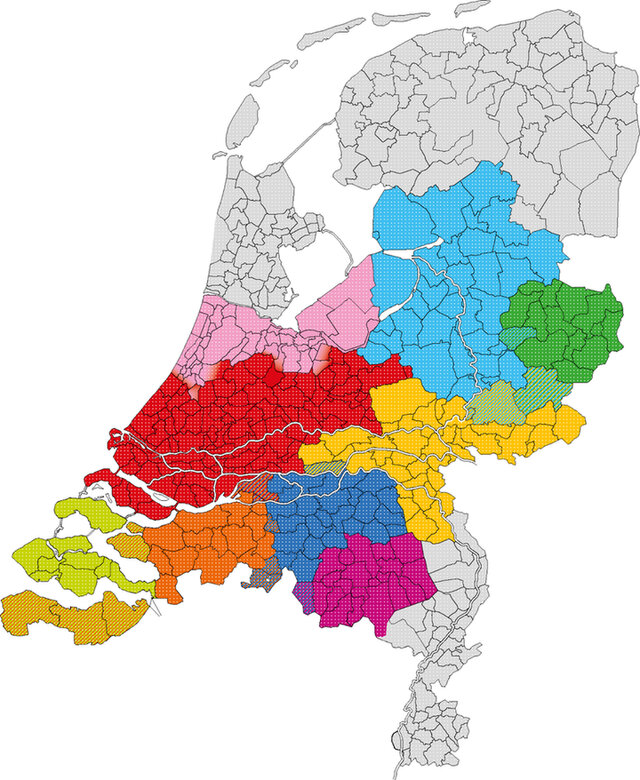

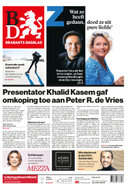
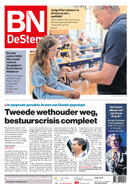
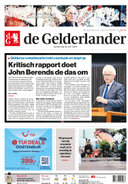

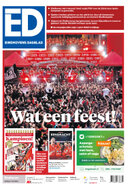
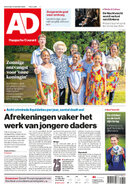
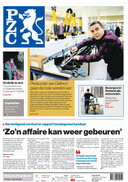

De regionale titels in Nederland
Ad Regio
de Stentor
Tubantia
De Gelderlander
Brabants Dagblad
Eindhovens Dagblad
BN DeStem
PZC
AD Landelijk
Kies jouw locatie

indebuurt.nl
Sinds een aantal jaren maakt ook indebuurt.nl onderdeel uit van ADR. Het gratis platform richt op alles wat een stad leuk maakt voor haar inwoners en is sterk gericht op het bieden van service. Zo geeft indebuurt.nl bezoekers informatie over nieuwe winkels, over uitgaan, activiteiten in de stad en bijzondere plekken. Inwoners worden uitgenodigd de redactie van tips te voorzien, of vrijblijvend teksten, foto’s of video’s aan te leveren. De makers van ‘indebuurt’ hebben de ambitie om gebruikers nauwer bij het stadsleven te betrekken.
indebuurt.nl is actief in 34 steden, vooral in plaatsen waar ook ADR-titels actief zijn. Artikelen van indebuurt.nl staan daarom ook op de sites en apps van de regionale titels van ADR en enkele malen per week in de gedrukte kranten. Per maand bezoeken ruim 2,5 miljoen mensen een van de secties. Daarmee staat ‘indebuurt’ in de top 10 van nieuwssites in Nederland.
Journalistiek & techniek
ADR-redacties maken gebruik van technische innovaties op het gebied van automatisering en kunstmatige intelligentie (AI). Het gebruik van spellingscorrectie is bijvoorbeeld al sinds jaar en dag ingeburgerd. Het is per definitie een journalist die bepaalt welk onderwerp wordt opgepakt en of wat er wordt gepubliceerd. AI wordt – nu nog experimenteel – gebruikt om teksten van bijvoorbeeld persberichten snel samen te vatten of tot een kort artikel te verwerken. Daarnaast kan AI ook suggesties doen voor spelling, grammatica, koppen en ideeën voor verhalen. De journalist bepaalt of suggesties worden overgenomen. We noemen deze werkwijze het mens-machine-mens-principe.
De redactie gebruikt automatisering het meest voor serviceberichten, zoals lokale weerberichten voor alle 342 gemeenten in Nederland. Als de verwachting is dat de temperatuur daalt van 2 naar -2, staat er een zin klaar die deze data-informatie vertaalt naar bijvoorbeeld ‘het gaat vriezen’ of ‘het kwik daalt onder nul’. De redactie vermeldt bij dit soort berichten dat ze automatisch zijn samengesteld. Automatisering kan ook worden gebruikt om op basis van data voor alle gemeenten in Nederland berichten te maken over bijvoorbeeld de afname van het gebruik van zonnepanelen of de toename van winkelleegstand. Het is een gespecialiseerde journalist die hiervoor data verzamelt en een basisbericht schrijft, eventueel aangevuld met andere bronnen. De techniek helpt ons om daar voor elke gemeente een eigen versie van te maken.
Cijfers
achter AD en de regionale titels
Gemiddeld dagelijks bereik
Het dagelijks bereik is een veelgebruikte indicatie van de impact die digitale journalistiek heeft. Maandbereik wordt ook weergegeven in de nationale monitors, maar daarin spelen eenmalige bezoekers van de sites een relatief grote rol.
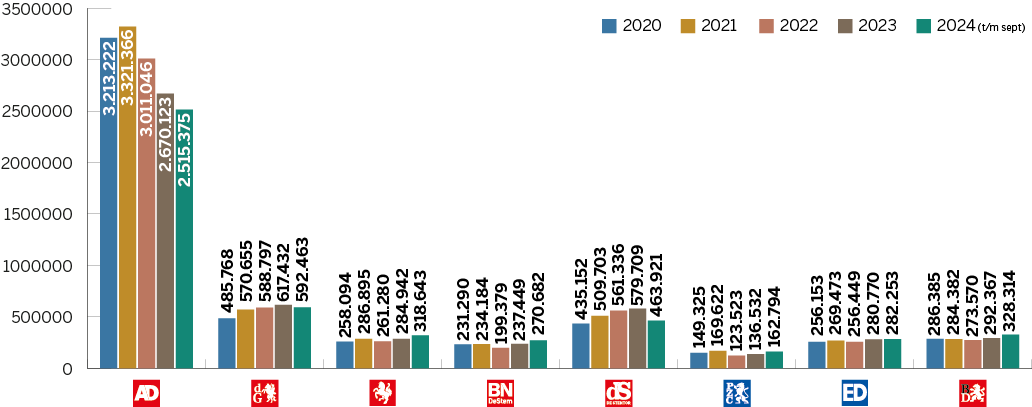
Journalisten in vaste dienst in 2024
Dit geeft de omvang van de redactie weer, omgerekend in voltijds banen (fte). Het zijn zowel de verslaggevers als de chefs, eindredacteuren, vormgevers, beeldredacteuren, video- en podcastmakers en onlineredacteuren. Om het beeld zuiver te houden zijn de freelance journalisten niet opgenomen. Die leveren eveneens een belangrijke bijdrage in de vorm van artikelen, columns, beeld, audio en video. Het zijn er soms honderden per titel. Aantal en werkzaamheden fluctueren van jaar tot jaar.

Meer info
Gemiddeld aantal unieke artikelen per dag
Dit is de hoeveelheid eigen artikelen die elke redactie produceert, van groot tot klein. De meeste redacties publiceren meer dan dat: bijvoorbeeld artikelen van de centrale redactie in het geval van de regionale kranten, of (in België) artikelen van collega-titels die worden doorgeplaatst. Die zijn niet meegeteld, net zo min als de kleine lokale berichten die automatisch worden gemaakt (zoals het weer en 112-berichten), of de doorgeplaatste artikelen van ‘Indebuurt’. Zo ontstaat het zuivere cijfer van wat de eigen redactie dagelijks maakt.

Meer info
Betalende abonnees
Dit is de som van papieren, digitale en hybride abonnementen. Het is het gemiddelde aantal over het desbetreffende jaar.

Rapportcijfers van eigen abonnees
Dit cijfer wordt gegeven door deelnemers aan een jaarlijks lezersonderzoek dat voor de meeste titels wordt gehouden.

Vertrouwenscijfer uit onderzoek
Dit cijfer is afkomstig uit recent onderzoek naar merkvertrouwen in opdracht van DPG Media. Daarbij geeft een algemeen publiek, dus niet alleen abonnees of bezoekers, vertrouwen in verschillende nieuwsmedia aan op een schaal van 0 (helemaal niet betrouwbaar) tot 10 (uiterst betrouwbaar). Daarnaast worden abonnees uitgesplitst, die hun titel doorgaans meer dan gemiddeld vertrouwen. Deze onderzoeksmethode en de uitkomsten komen overeen met die van het jaarlijkse Digital News Report van het Reuters Institute in Oxford. De Nederlandse en Vlaamse gemiddelde vertrouwenscijfers liggen in die monitor hoger dan die van nieuwsmedia in de omringende Europese landen.
Algemeen publiek
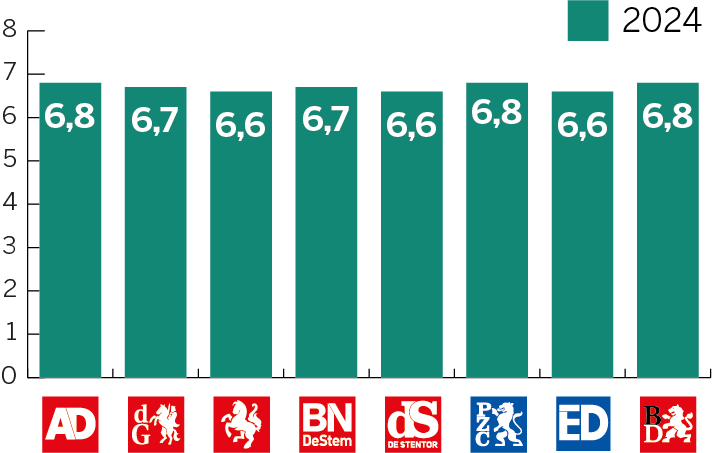
Abonnees
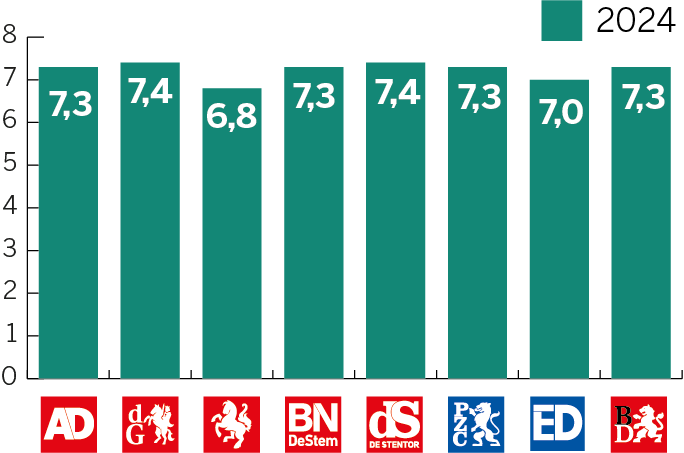
Aantal podcastafleveringen per jaar van alle titels
Deze cijfers geven aan hoeveel podcasts er door de verschillende titels zijn ontwikkeld.
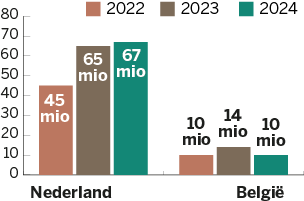
Gemiddeld aantal unieke video's per dag
Deze cijfers geven aan hoeveel video's er door de verschillende titels zijn ontwikkeld.
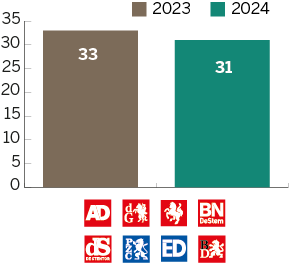
Dagelijks bereik
Gemiddeld dagelijks bereik
Het dagelijks bereik is een veelgebruikte indicatie van de impact die digitale journalistiek heeft. Maandbereik wordt ook weergegeven in de nationale monitors, maar daarin spelen eenmalige bezoekers van de sites een relatief grote rol.
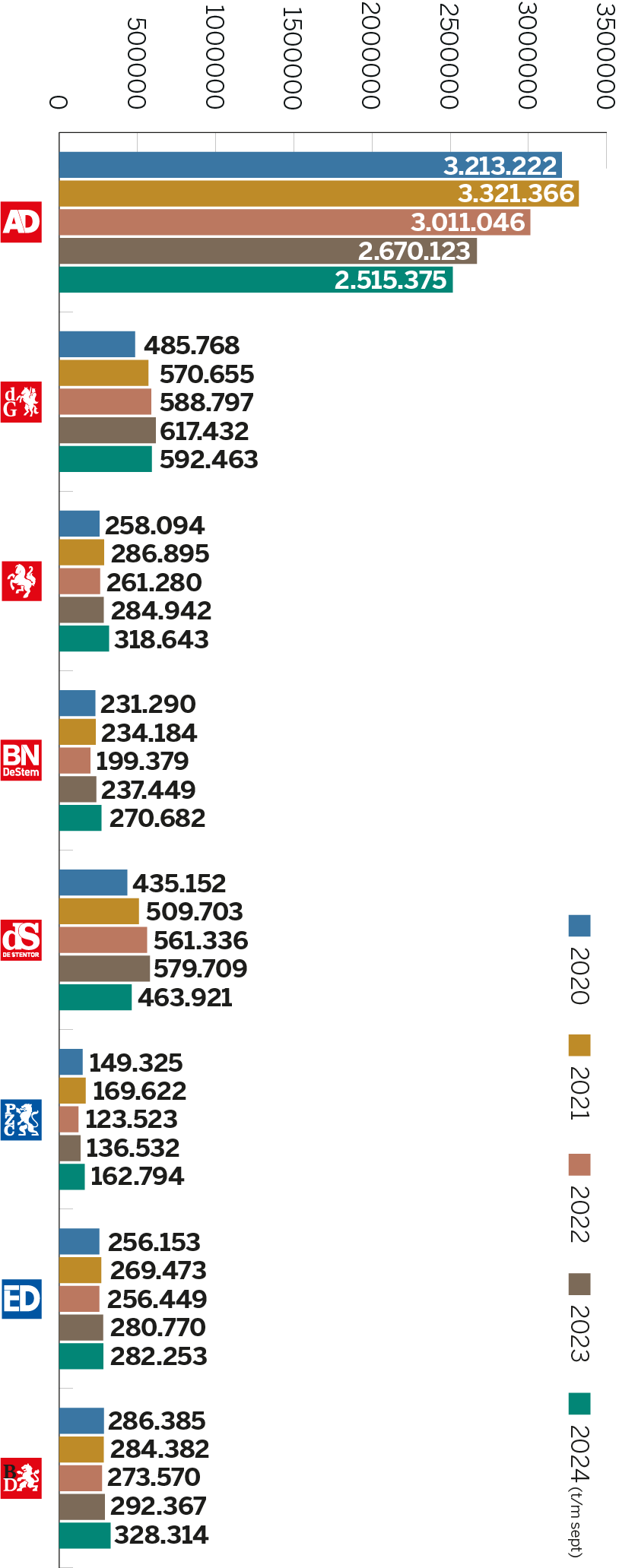
Betalende abonnees
Betalende abonnees
Dit is de som van papieren, digitale en hybride abonnementen. Het is het gemiddelde aantal over het desbetreffende jaar.

Rapportcijfer van abonnees
Rapportcijfers van eigen abonnees
Dit cijfer wordt gegeven door deelnemers aan een jaarlijks lezersonderzoek dat voor de meeste titels wordt gehouden.

Journalisten in vaste dienst
Journalisten in vaste dienst in 2024
Dit geeft de omvang van de redactie weer, omgerekend in voltijds banen (fte). Het zijn zowel de verslaggevers als de chefs, eindredacteuren, vormgevers, beeldredacteuren, video- en podcastmakers en onlineredacteuren. Om het beeld zuiver te houden zijn de freelance journalisten niet opgenomen. Die leveren eveneens een belangrijke bijdrage in de vorm van artikelen, columns, beeld, audio en video. Het zijn er soms honderden per titel. Aantal en werkzaamheden fluctueren van jaar tot jaar.

Meer info
Unieke artikelen per dag
Gemiddeld aantal unieke artikelen per dag
Dit is de hoeveelheid eigen artikelen die elke redactie produceert, van groot tot klein. De meeste redacties publiceren meer dan dat: bijvoorbeeld artikelen van de centrale redactie in het geval van de regionale kranten, of (in België) artikelen van collega-titels die worden doorgeplaatst. Die zijn niet meegeteld, net zo min als de kleine lokale berichten die automatisch worden gemaakt (zoals het weer en 112-berichten), of de doorgeplaatste artikelen van ‘Indebuurt’. Zo ontstaat het zuivere cijfer van wat de eigen redactie dagelijks maakt.

Meer info
Vertrouwenscijfer uit onderzoek
Vertrouwenscijfer uit onderzoek
Dit cijfer is afkomstig uit recent onderzoek naar merkvertrouwen in opdracht van DPG Media. Daarbij geeft een algemeen publiek, dus niet alleen abonnees of bezoekers, vertrouwen in verschillende nieuwsmedia aan op een schaal van 0 (helemaal niet betrouwbaar) tot 10 (uiterst betrouwbaar). Daarnaast worden abonnees uitgesplitst, die hun titel doorgaans meer dan gemiddeld vertrouwen. Deze onderzoeksmethode en de uitkomsten komen overeen met die van het jaarlijkse Digital News Report van het Reuters Institute in Oxford. De Nederlandse en Vlaamse gemiddelde vertrouwenscijfers liggen in die monitor hoger dan die van nieuwsmedia in de omringende Europese landen.
Algemeen publiek
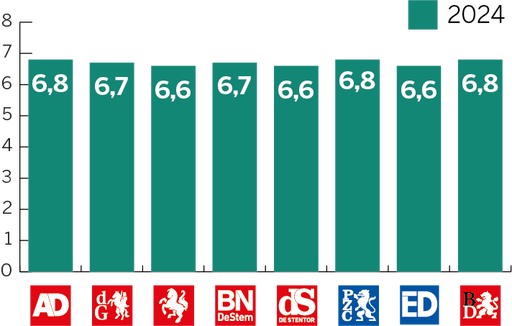
Abonnees
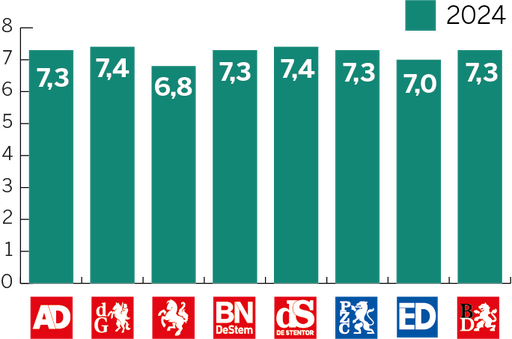
Aantal podcastafleveringen
Aantal podcastafleveringen per jaar van alle titels
Deze cijfers geven aan hoeveel podcasts er door de verschillende titels zijn ontwikkeld.

Aantal unieke video's
Gemiddeld aantal unieke video's per dag
Deze cijfers geven aan hoeveel video's er door de verschillende titels zijn ontwikkeld.


